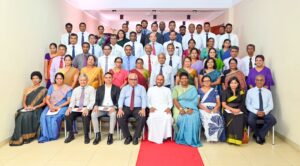
Ministry of Agriculture and Plantation Industries and Unilever Sri Lanka recently entered into a Memorandum of Understanding (MoU) to develop the country’s first national and globally accepted standard for sustainable tea production. This first-of-its-kind initiative signifies a shared commitment to propel the Sri Lankan tea industry towards a more sustainable and ethical future.
The MoU signing ceremony was graced by Honourable Mahinda Amaraweera, Minister of Agriculture and Plantation Industries, Mr. B. L. A. J. Dharmakeerthi, Secretary, the Ministry of Agriculture and Plantation Industries, Chairman & Representatives of Sri Lanka Tea Board and other tea industry dignitaries.
Unilever Sri Lanka’s ‘Ceytea’ factory is the largest supplier of black tea extract to the Global Pepsi-Lipton JV and its world-famous Iced Tea brands ‘Lipton’ and ‘Brisk’. The manufacturing site in ‘Agarapathana’ has been at the center stage of innovation and sustainability in value-added tea.
Damith Abeyratne, Supply Chain Director at Unilever Sri Lanka said, “Unilever Ceytea factory in Agarapathana is the largest supplier of black tea extract to the Global Pepsi-Lipton JV. This collaboration with the Ministry of Agriculture and Plantation Industries is a significant step forward in our efforts to drive sustainable sourcing of agricultural raw materials under the Unilever Climate Action Transition Plan. The initiative positively benefits ‘Ceylon Tea’ because today’s global demand is for sustainably farmed agricultural produce.”
Further commenting on this partnership, B.L.A.J. Dharmakeerthi, Secretary at the Ministry of Agriculture and Plantation Industries, stated, “The Ministry of Agriculture and Plantation Industries is delighted to join forces with Unilever Sri Lanka in this public-private partnership. This MoU represents a crucial step towards strengthening the Ceylon Tea industry’s global competitiveness. By implementing these comprehensive measures, we aim to solidify Sri Lanka’s reputation as a global leader in ethical and sustainable tea production.”
Sri Lanka is among the top five tea exporters globally. This Standard will address three key areas: minimizing environmental impact through regenerative and deforestation-free agriculture, ensuring fair and respectful treatment for all tea industry workers through ethical workplace practices, and guaranteeing the safety and quality of Sri Lankan tea through rigorous testing and monitoring procedures
END
